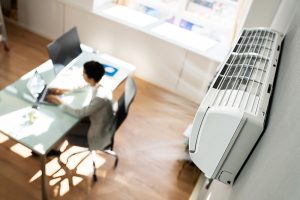
Heat pumps are everywhere. It’s true, if you were to look at a comparison of heat pump technology 15 years ago with now, you’d see a major spike in the usage and distribution of this technology. But it’s not an accident.
Heat pumps represent a new way of approaching heating or cooling a home. They move heat from one place to another, similarly to how a central air conditioner removes heat from your home. But the big advancement comes from their ability to bring heat into your house during a cold season. If you’re exploring this option for the first time, check out this comprehensive overview on how heat pumps work and why they’re a smart choice for year-round comfort.
Want to learn more about our heat pump service in Keller, TX? Give us a call or keep reading.
Why Heat Pumps Are Among the Most Efficient Systems
So much of the 21st century and its appliances relies on superior efficiency. Electricity and other fuel source prices have risen tremendously while people’s incomes have remained rather stagnant. This means that people need more from the same amount of energy they consume, so they don’t go over budget.
This is why investing in a high-efficiency HVAC system is so important. It lets you stay comfortable without spending more money month after month. And when it comes to efficiency, the heat pump is king.
How Heat Pump Systems Work (Simplified)
How does a heat pump work so efficiently? It moves heat instead of creating heat. A furnace, in comparison, has to burn gas or heat up an electric coil to create heat for your home. It works, but it’s actually highly energy-intensive. It just so happens that natural gas is cheaper than electricity, so this is still an affordable option.
A heat pump simply attracts heat from the outside, even when temperatures are below freezing, and places it inside your home. This process is not only more efficient than burning fuel or using electric resistance to generate heat, it’s 300% more efficient, which means it uses a third of the energy that conventional heating units would use. That’s a big difference! And when issues arise, knowing how to respond is easier with a helpful guide to troubleshooting heat pump problems that walks you through common signs and solutions.
How to Get Your Home Ready for a Heat Pump
So, you’ve decided that a heat pump installation is right for you. How do you get ready for this purchase? Here’s a list to help:
- Start by figuring out which type of heat pump you’d like to purchase. There are standard, ducted heat pumps that take the place of your air conditioner, furnace, or both. These units can use your air ducts that already exist. Or you can install a ductless system that doesn’t require air ducts at all. These units work with air handlers mounted on your walls, ceilings, or floors.
- Schedule maintenance on a yearly basis so your system stays as efficient and optimized as possible. This will be your key to a heat pump that lasts!
- Don’t forget to keep repairs on your radar. Investing in a new heat pump is a great way to ensure you’re set up for success, but it doesn’t mean the system is immune to its own problems. Be sure to call our team whenever you notice something wrong.
Frequently Asked Questions
Question: What makes heat pumps more efficient than traditional heating systems?
Answer: Heat pumps move heat instead of generating it, pulling warmth from the air or ground and transferring it indoors. This process often makes them two to three times more efficient than furnaces or electric heating, lowering utility bills while reducing energy use.
Question: How do heat pumps provide both heating and cooling in one system?
Answer: A heat pump works like an air conditioner in summer, removing indoor heat and releasing it outside. In winter, the process reverses, capturing heat from the outdoors and bringing it inside, allowing one system to handle year-round comfort.
Question: Are heat pumps effective in colder climates?
Answer: Modern heat pumps are designed to work efficiently even in cold weather. While extremely low temperatures may reduce performance, many models can still provide reliable heating with the help of backup systems when necessary.
Question: What types of heat pump systems are available?
Answer: Homeowners can choose from ducted systems that connect to existing HVAC ducts or ductless systems with wall-mounted indoor units. The best option depends on whether your home already has ductwork and how much zoning control you want.Question: How should a heat pump be maintained for best performance?
Answer: Heat pumps require regular professional maintenance, typically once a year, to stay efficient. Routine care includes cleaning coils, checking refrigerant levels, and inspecting components to ensure reliable operation and a longer system lifespan.
Contact Coventry & Gattis A/C, Inc. for comprehensive heat pump support.
